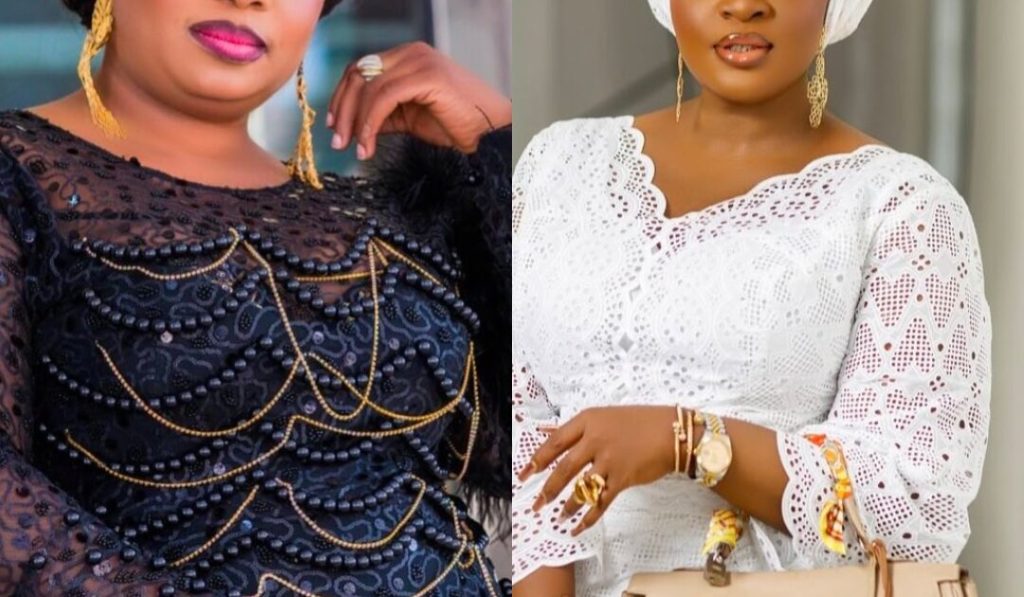The Nigerian entertainment industry, popularly known as Nollywood, witnessed a public clash between two prominent actresses, Laide Bakare and Eniola Badmus, at the premiere of the movie “Owambe Thieves.” The incident, which unfolded at the Circle Mall in Lekki, Lagos, quickly escalated from a verbal confrontation to a viral social media sensation. The spark that ignited the conflict appeared to stem from a photograph of Eniola Badmus shared by Laide Bakare, which Badmus deemed unflattering and criticized as “animalistic behavior.” This seemingly minor act triggered a chain reaction, culminating in a heated exchange captured on video and subsequently shared across various social media platforms.
The video footage depicts a tense atmosphere at the movie premiere, where Bakare directly questioned Badmus’ mental state, a remark that visibly irked Badmus, who responded with a sharp glare before attempting to disengage from the confrontation. The situation further intensified when a man presumed to be Badmus’ bodyguard intervened, attempting to de-escalate the conflict. However, Bakare remained resolute, refusing to back down and challenging the bodyguard’s intervention. This public display of discord between the two actresses immediately caught the attention of onlookers and rapidly spread through social media, fueling speculation and commentary among fans and industry observers.
Following the public altercation, Laide Bakare took to her Instagram account to further address the conflict. She shared private messages exchanged between herself and Eniola Badmus, providing context to the escalating tension. The messages revealed Badmus’ disapproval of the shared photograph and her subsequent criticism of Bakare’s actions. In her Instagram post, Bakare characterized Badmus as an ingrate, asserting that she had played a pivotal role in launching Badmus’ career by offering her a significant role at a time when other filmmakers were hesitant to cast her due to her weight. This claim added another layer of complexity to the public feud, raising questions about the history of their professional relationship and the underlying motivations behind the conflict.
The public fallout between Bakare and Badmus highlights the often-volatile dynamics within the entertainment industry, where personal and professional lives frequently intersect. The rapid dissemination of the video and subsequent social media exchanges amplified the conflict, transforming a private disagreement into a public spectacle. This incident underscores the increasing influence of social media in shaping public perception and the potential for online platforms to both exacerbate and escalate interpersonal conflicts. The clash between these two Nollywood actresses serves as a reminder of the challenges faced by public figures in navigating their personal and professional relationships within the digital age.
The core of the dispute appeared to revolve around the shared photograph and the perceived disrespect it represented. Badmus’ strong reaction to the image suggests a sensitivity to public image and the potential impact on her career. Bakare’s subsequent portrayal of herself as a benefactor who had supported Badmus in the early stages of her career further complicates the narrative. Her claim of offering Badmus a crucial opportunity when others were reluctant to do so positions her as instrumental in Badmus’ success. This narrative frames the conflict not only as a personal disagreement but also as a betrayal of professional support and mentorship.
The public nature of the conflict and the involvement of social media raise important questions about the boundaries between private and public life for individuals in the entertainment industry. The speed and reach of online platforms allow for the rapid dissemination of information, which can both amplify and distort narratives. In this case, the shared video and subsequent Instagram posts served to escalate the conflict, drawing in a wider audience and fueling further speculation. This incident underscores the challenges faced by public figures in managing their reputations and navigating interpersonal conflicts within the digital landscape. The Bakare-Badmus feud serves as a case study in the complexities of celebrity relationships and the influence of social media in shaping public perception of such conflicts.














